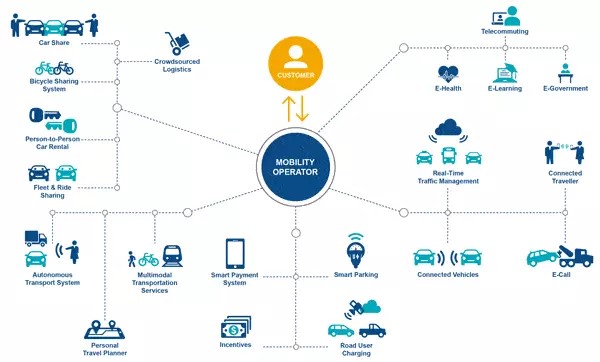By Maya Ben Dror and Maya Azaria
The COVID-19 pandemic forced Israel to modernize its transport network almost overnight. Commuter volume decreased after lockdown, but Israel still needed to move a large number of essential workers quickly and cost-effectively, while allowing fewer people onto public transit to observe social distancing rules.
To facilitate efficient low-occupancy commutes during the pandemic, Israel led an ad-hoc initiative to leapfrog out of outdated transit services. Its experience shows that change in this sector is possible, and could serve as a model for many other congested, polluted cities and countries that aspire to a cleaner and more equitable future.
Smart commuting
One of the most groundbreaking ideas for transforming the world’s creaking transport systems and clogged roads has been to see mobility as a service that enables a person to get from one place to another, rather than a product, such as a car or bike that one has to own or maintain. The market for mobility as a service (also known as MaaS) is expected to grow by $180 billion from 2019 to 2023.
Commuters using MaaS would, for example, be able to enter their destination into an app, which then offers a range of options such as car- or bike-sharing, bus and train, taxis or car rental, or a combination of these options.
Israel did just this when it mobilized 176,500 responders for the national effort to fight COVID-19. In place of its existing rigid transport network, it introduced a tailored commuting system. An on-demand transit routing algorithm calculated the most efficient journey for each passenger and routed buses accordingly. In a trial involving 5,500 responders, users simply entered their location and planned destination via a specially created app. In 60% of cases, they were dropped-off within 300 meters of their destinations. With the right public-private partnerships, it could easily be replicated in other countries that need to upgrade their systems.
Innovation boom
Many Israeli innovations introduced over the past few years have attracted attention during the coronavirus crisis. Such as digitizing transit to mobilize commuters more efficiently and safely, while others address the need to improve air quality to aid respiratory health. They include technologies to extend the range of batteries, which would make electric vehicles more competitive with traditional cars and improve air quality.
Another set of solutions harvests transport data that will help transit authorities and operators improve and tailor their services. There has also been substantial private investment in companies that convert old, fixed transport networks into flexible, on-demand services that enable operators to adapt their services to different commutes. Other emerging technologies developed by Israeli companies include using artificial intelligence to automatically detect and record incidents on the road.
The challenge is to implement these solutions for the long term to create a transportation system that revolves around human needs and priorities, such as safety, health, accessibility, and better living. Israel’s transport overhaul shows that a country can adopt a cleaner, more convenient, and more cost-effective way of travel with the help of technology and the right public-private partnerships.
Dror, Maya Ben, and Maya Azaria. “Israel’s ‘Smart Commuting’ Shows What Transport Could Be like after COVID-19.” World Economic Forum. www.weforum.org/agenda/2020/07/israel-smart-commuting-after-covid-public-transport-innovation/
Analysis–
This article discusses Israel’s efforts to improve their public transit system in reaction to COVID-19. I think Israel is a great place to look at as an example of how the U.S. can work on improve its own transportation sector. This article is relevant to my research topic because it provides me with examples of how public transportation can be changed in response to COVID-19. Israel’s transportation network efficiently schedules passengers’ rides while keeping them and the conductors safe. Also the consideration of air quality and general public health shows how well thought out this plan was. With a system that prioritizes human needs, like safety, health and accessibility, Israel is heading in the right direction. This was an interesting business model to look into. This would help me develop a service that could help provide transportation to passengers while considering their safety and the workers’ safety.




